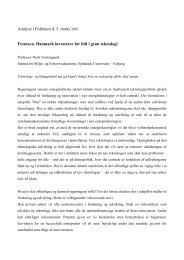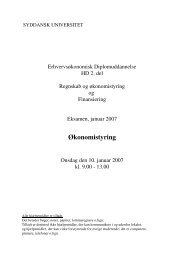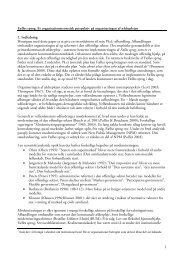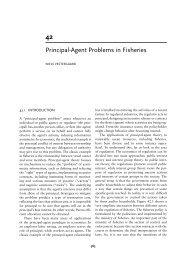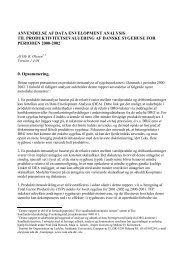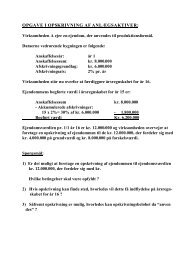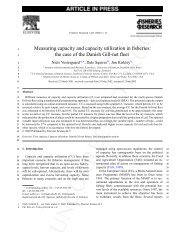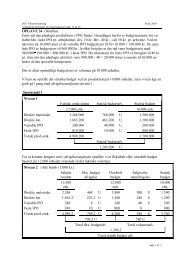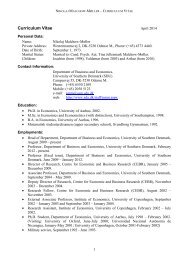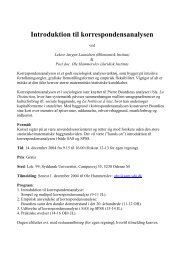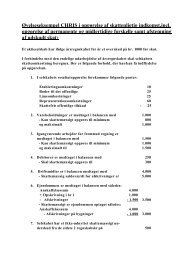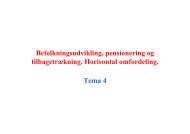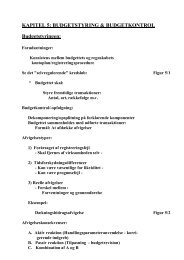To conclude, the Freedom Union (UW) was mostly concerned about the macroeconomic reforms<strong>and</strong> simplication <strong>of</strong> the tax system, adaption to the EU <strong>and</strong> promotion <strong>of</strong> f<strong>in</strong>ancial discipl<strong>in</strong>e. Theaim was the fast as possible transition to market economy <strong>and</strong> liberal democracy <strong>of</strong> the westerntype. The SLD led governments were mostly critisized for alleged mistakes <strong>in</strong> the economic policywithout lay<strong>in</strong>g much emphasis on the SLD’s <strong>and</strong> PSL’s common background <strong>in</strong> the old statesocialist system.Thus the Democratic Union (UD) ma<strong>in</strong>ly appealed to the moderate groups <strong>in</strong>dside the opposition tothe communist former regime. Several leaders had taken part <strong>in</strong> the round table negotiations <strong>and</strong>defended the agreements, that were entered dur<strong>in</strong>g those negotiations. One <strong>of</strong> the spokesmen thechief redactor <strong>of</strong> “Gazeta Wyborcza” Adam Michnik argued that the round table negotations was themost clever political decision ever taken <strong>in</strong> the 20 century’s Pol<strong>and</strong> 71 . Identity <strong>and</strong> moral politicswere at a discount <strong>and</strong> the attitudes to communisation <strong>and</strong> <strong>and</strong> the role <strong>of</strong> church was clearlydeviat<strong>in</strong>g. The Democractic Union (UD) <strong>and</strong> the Freedom Union (UW) spoke <strong>in</strong> favour <strong>of</strong> astructural, not a personal reckon<strong>in</strong>g with the communist past <strong>and</strong> rejected the pr<strong>in</strong>ciple aboutcollective guilt. The lack <strong>of</strong> legal garantees <strong>in</strong> the proposals put forward about decommunisation bythe right-tradionalist parties was heavily critisized <strong>and</strong> several among the law proposals put forward<strong>in</strong> the parliament were voted down by votes from non only “post-communists”, but also theFreedom Union (UW), even <strong>in</strong> times when the UW was <strong>in</strong> the government together with the AWS.The Freedom Union (UW) suffered from the low developed middle class. Thus, the liberal slogansappealed to rather few people, mostly “w<strong>in</strong>ners” <strong>of</strong> the transformation. The UW ga<strong>in</strong>ed 14 pct. <strong>of</strong>the votes at the 1997 election, but the fight <strong>of</strong> ga<strong>in</strong><strong>in</strong>g the middle class votes rema<strong>in</strong>ed <strong>in</strong>tense. Themajority <strong>of</strong> the new entrepreneurs did not vote the Freedom Union (UW), rather the left w<strong>in</strong>g SLD,because new entrepreneurs were dependent on the state. The Freedom Union (UW) appealed to theupper strata <strong>of</strong> the middle class, but that group rema<strong>in</strong>ed rather small. Furthermore, it became aproblem that UW was not able to present its own c<strong>and</strong>idate at the 2000 presidential election. Thebreak with the AWS <strong>and</strong> the withdrawal from government did not mean an improvement <strong>in</strong> thevoter appeal. In fact, the decl<strong>in</strong>e <strong>in</strong> the share <strong>of</strong> the votes cont<strong>in</strong>ued accord<strong>in</strong>g to most op<strong>in</strong>ionpolls 72 .The pressure aga<strong>in</strong>st Balcerowicz <strong>in</strong>creased after the presidential election autumn 2000, where the<strong>in</strong>dependent liberal president c<strong>and</strong>idate Andrzej Olechowski obta<strong>in</strong>ed about two third <strong>of</strong> thetraditionally UW votes. The f<strong>in</strong>al result was the resignation <strong>of</strong> Balcerowicz as party chairman. Theformer foreign m<strong>in</strong>ister <strong>and</strong> more social liberal <strong>in</strong>cl<strong>in</strong>ed Bronislaw Gemerek was put forward as thenew chairman. In the end, Gemerek was elected as the new chairman, but first after contestedelection with the more neoliberal Donald Tusk. Donald Tusk spoke <strong>in</strong> favour <strong>of</strong> establish<strong>in</strong>g amodern right w<strong>in</strong>g party, democratic, pro-market <strong>and</strong> <strong>in</strong>dependent <strong>of</strong> the church. With the election<strong>of</strong> Bronislaw Gemerek a more social liberal <strong>and</strong> centristic policy l<strong>in</strong>e was followed, but the election<strong>of</strong> a new chairman (Gemerek) did not secure the renewal, that many voters <strong>and</strong> party membersdem<strong>and</strong>ed.The change <strong>of</strong> party leader re<strong>in</strong>forced the competition about ga<strong>in</strong><strong>in</strong>g support from the middle classvoters. The liberal president c<strong>and</strong>idate Andrzej Olechowski put forward plans about closer71 Adam Michnik, “Independence Reborn <strong>and</strong> the Demons <strong>of</strong> the Velvet Revolution”, <strong>in</strong> Antohi <strong>and</strong> Tismaneauni,1999:83.72 Base on the analyse presented by Doreta Macieja, “Zakladnicy etosu”, Wprost, 3, September, 2000.82
cooperation between the liberal parties with SKL <strong>and</strong> Freedom Union (UW) as the key parties. Theleadership <strong>of</strong> the Freedom Union (UW) was not will<strong>in</strong>g to give people from Olechowski’s campaccess to the party lists at the 2001 election as Olechowski put forward tough conditions for furthercooperation. Fullfilment <strong>of</strong> the conditions <strong>in</strong> reality would mean the clos<strong>in</strong>g down <strong>of</strong> the party <strong>and</strong>the establishment <strong>of</strong> a new one. The messages from the chairman <strong>of</strong> parliament Maciej Plazynski tothe UW congress <strong>in</strong> December 2000 was more conciliatory than that given by AndrzejOlechowski 73 .In 2001 the looser <strong>in</strong> the fight for the post as UW chairman, Donald Tusk left the party <strong>and</strong> becameone <strong>of</strong> the orig<strong>in</strong>ators <strong>of</strong> the new liberal platform, the Civic Platform (PO). After the election defeat<strong>in</strong> 2001 <strong>and</strong> the loss <strong>of</strong> parliamentary representation the chairmanship <strong>of</strong> the Freedom Union (UW)was taken over by Wladislaw Frasuniuk. Donald Tusk, together with other centrally placed people<strong>in</strong>side <strong>and</strong> ooutside the Freedom Union (UW) jo<strong>in</strong>ed the new liberal party, The Civic Platform(PO). The leadership <strong>of</strong> the new party <strong>in</strong>cluded the “three tenors”, besides Tonald Tusk, the thenchairman <strong>of</strong> the Sejm <strong>and</strong> memer <strong>of</strong> AWS, Maciej Plazynski, <strong>and</strong> the former liberal c<strong>and</strong>idate forpresident, Andrzej Olechewski. The Platform (PO) mostly appealed to well educated <strong>and</strong> newentrepreneurs <strong>in</strong> the big towns, <strong>of</strong>ten without any l<strong>in</strong>ks to the Solidarity movement <strong>and</strong> dissidentgroups from the time <strong>of</strong> communism. The electoral support was particularly great <strong>in</strong> the better <strong>of</strong>ftowns <strong>and</strong> regions like Gdansk-Sopot-Gdynia <strong>in</strong> the North. In conformity with the liberal basicpr<strong>in</strong>ciples the Civic Platform (PO) dem<strong>and</strong>ed a limitation <strong>of</strong> the <strong>in</strong>fluence <strong>of</strong> the trade unions, directelection <strong>of</strong> mayers, simplification <strong>and</strong> lower<strong>in</strong>g <strong>of</strong> taxes <strong>in</strong>clud<strong>in</strong>g flat l<strong>in</strong>ear taxation <strong>and</strong> a hard l<strong>in</strong>eaga<strong>in</strong>st corruption <strong>and</strong> dom<strong>in</strong>ance <strong>of</strong> parties <strong>in</strong> the public sector. PO also talked <strong>in</strong> favour <strong>of</strong> a“simplification” <strong>of</strong> the constitution <strong>in</strong>clud<strong>in</strong>g a reduction <strong>in</strong> tthe number <strong>of</strong> MP’s <strong>and</strong> limitiation <strong>of</strong>immunity.Thus, the new part became a spokesman for “modern” secular European values <strong>in</strong> contrast to theconservative-traditionalistic <strong>and</strong> xenophobic values from PiS <strong>and</strong> <strong>in</strong> particular by the League <strong>of</strong>Polish Families (LPR). Much critique was raised aga<strong>in</strong>st the trade union Solidarity <strong>and</strong> not least thechairman Marian Krzaklewski. The political biography <strong>of</strong> the PO-leaders was different from thethose <strong>of</strong> the Freedom Union (UW). Opposite, UW, the Civic Platform (PO) appealed to the youngergeneration, who wanted new people <strong>in</strong> the front, not the old guys” from the beg<strong>in</strong>n<strong>in</strong>g <strong>of</strong> the 1990’s.In other words, The Freedom Union (UW) had been hit by the well known political “metal fatigue”.In pr<strong>in</strong>cple, the Civic Platform (PO) could have entered a historical compromise with the “postcommunists”,i.e. SLD, as the new party does not have roots <strong>in</strong> the dissident milieus <strong>and</strong> thedifferences on the policy level between the liberals <strong>and</strong> the SLD are rather modest. At leastunformal cooperation with the SLD could not be excluded, should the government cooperationbetween SLD-UP <strong>and</strong> the peasant party PSL fail 74 . In fact such “tacit cooperation” took place afterthe resignation <strong>of</strong> Leszek Miller as premier <strong>and</strong> the establishment <strong>of</strong> Marek Belka’s transitorygovernment.At the beg<strong>in</strong>n<strong>in</strong>g the new platform ga<strong>in</strong>ed surpris<strong>in</strong>gly favourable figures <strong>in</strong> the op<strong>in</strong>ion polls,mostly as a protest aga<strong>in</strong>st the already established parties, <strong>and</strong> with strong support from the new73 Jan<strong>in</strong>a Paradowska, “Bronislaw Gemerek przewodniczacym UW, Unia do skladania”, Polityka no. 52 (2277), 23December 2000.74 Underl<strong>in</strong>ed e.g. by Jadwiga Staniszkis, see <strong>in</strong>terview <strong>in</strong> Rzeczpospolita 22 May 2001 (“Polska potrzebuje rzadu SLDz Platforma Obywatelska”), <strong>in</strong> which she talkes about a SLD-OP government, at the same time exlud<strong>in</strong>g a SLD-UWgovernment for historical reasons.83
- Page 3:
“This provisional situation chara
- Page 6 and 7:
marketisation and privatisationshor
- Page 8 and 9:
purposes, are channels for “expre
- Page 10 and 11:
the significance of strategic choic
- Page 12 and 13:
presidentialism gave rise to “flo
- Page 14 and 15:
antipolitics and reinforcement of a
- Page 16 and 17:
In the late 1990’s elections most
- Page 18 and 19:
determined primarily by “politica
- Page 20 and 21:
politics and antipolitics, all sign
- Page 22 and 23:
which attitudes to state regulation
- Page 24 and 25:
Anti-communism has been defined in
- Page 26 and 27:
elections and the Slovak communists
- Page 28 and 29:
Cartel agreementsbetter representat
- Page 30 and 31:
Basically the absence of clear cons
- Page 32 and 33: After 1989 different types of polit
- Page 34 and 35: complex project for transition unde
- Page 36 and 37: window of opportunity in spite of s
- Page 38 and 39: analyses of party institutionalizat
- Page 40 and 41: political messages and slogans. Thu
- Page 42 and 43: well established party culture may
- Page 44 and 45: expected, much due to the many spli
- Page 46 and 47: Furthermore, the polarisation on el
- Page 48 and 49: Finally, Solidarity can also be con
- Page 50 and 51: whole, on the one side an authorita
- Page 52 and 53: The economic recession and the grav
- Page 54 and 55: election defeat more cooperation an
- Page 56 and 57: The formation of AWS can be conside
- Page 58 and 59: group. RS AWS constituted the Chris
- Page 60 and 61: According to the original plans the
- Page 62 and 63: values. According to Rybicki, as so
- Page 64 and 65: AWS should fight against all types
- Page 66 and 67: 2001 parliamentary election, howeve
- Page 68 and 69: and workers voted ZChN. At the 1993
- Page 70 and 71: The League has been considered as a
- Page 72 and 73: establishment like than LPR’s. Th
- Page 74 and 75: jobs in rural areas, especially sma
- Page 76 and 77: industrial policy. According to the
- Page 78 and 79: pressurizing the government to give
- Page 80 and 81: democrats, thereby locating itself
- Page 84 and 85: Polish middle class. Thus, in Janua
- Page 86 and 87: such as KSCM and KSS in The Czech R
- Page 88 and 89: The SLD leaders were mainly recruit
- Page 90 and 91: the falling popular support for pri
- Page 92 and 93: innovation was formation of the pol
- Page 94 and 95: place after talks with each applica
- Page 96 and 97: Has the Left any freedom of manoeuv
- Page 98 and 99: medicine, changes in the labour cod
- Page 100 and 101: The Labour Union (UP), Democratic U
- Page 102: Nevertheless, before that had taken



